Story
A Force of Nature
Amelia Franck Meyer (BF 2015) is transforming the child welfare systems so all children can live safely with their families
DATE
May 6, 2024
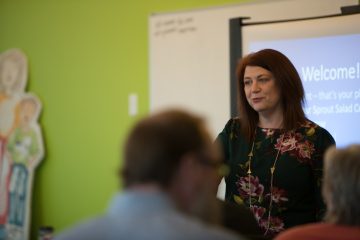
By Mo Perry
We’re revisiting some of the stories we’ve told over the years, highlighting the work of grantees and Fellows working to create big change in communities across the region. One story is that of Amelia Franck Meyer, a Bush Fellow committed to transforming foster care to keep more children safely with their families. A longer version of this story was originally published in 2019.
For more than three decades Amelia Franck Meyer (BF 2015) has been working in the child welfare system. From work in individual group homes to leading regional agencies, her entire career has been dedicated to ensuring children can live safely with their families.
Since receiving a Bush Fellowship in 2015, she has turned her focus to transforming the entire U.S. child welfare system. In Franck Meyer’s view, this transformation has the potential to positively impact societal challenges ranging from incarceration to homelessness to health care.
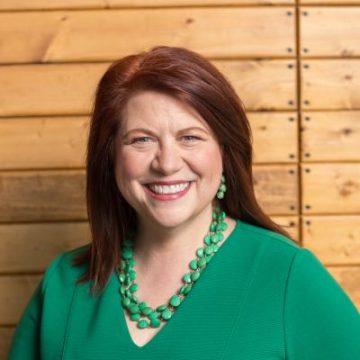
I used to get called all the time to make the case for why child welfare needs to transform. Nobody calls me for that anymore. Now they say, ‘We know it needs to change. Help us figure out how to do it.’
Amelia Franck Meyer, Founder and Executive Officer, Alia Innovations (Photo: David Ellis)
Nine years later, her efforts are showing results. One notable sign of Franck Meyer’s success is the shift in the child welfare sector toward prioritizing connection and permanence for kids. “I used to get called all the time to make the case for why child welfare needs to transform. Nobody calls me for that anymore. Now they say, ‘We know it needs to change. Help us figure out how to do it,’” she says.
Facing Reality
Franck Meyer’s transformative goals are based on a difficult truth: In most cases, children left in abusive and neglected environments tend to fare better than those who enter foster care. Studies have shown that maltreated youth who are left in their own homes are far less likely to become pregnant as teenagers, less likely to wind up in the juvenile justice system and more likely to hold a job for at least three months than comparably maltreated children placed in foster care. “The cure is worse than the disease,” says Franck Meyer. “We can’t leave kids alone to fend for themselves, but what we’re doing is making it worse.”
About 650,000 children spend time in foster care each year, and approximately half of them are placed with strangers. Once within the foster care system, children are moved from family to family an average of once or twice every year. According to Franck Meyer, this separation of children from the only family they know — even if that family is abusive or neglectful — and the subsequent pattern of being moved from home to home creates significant trauma.
This attachment trauma can be predictive of future problems ranging from addiction to depression to chronic disease. “The pain of not belonging, that profound loneliness, is so significant that people will use drugs and alcohol to numb it,” says Franck Meyer. “They may fall into despair or become so completely numb that they disconnect from all humans and they may become capable of the kind of violence we witness on the news every night.”
And this kind of trauma is cyclical, spiraling down through generations. Young women in foster care are more than twice as likely as their peers to get pregnant before the age of 19, while also facing a greater likelihood of homelessness, incarceration, PTSD, depression, anxiety and addiction — all of which set them and their offspring up to repeat the cycle of entering the child welfare system.

In 2001, while leading a child welfare agency now known as Anu Family Services, Franck Meyer launched a national research project to determine permanency rates (the rates at which foster children are placed with legally permanent families, whether through reunification with birth families, adoption or guardianship by relatives) by top-performing child welfare agencies in the country. The research showed that, nationwide, only 30% to 40% of children were placed in permanent homes after being in foster care, with top-performing agencies maxing out at around 45%.
“Every child on the planet needs their mom in order to be OK, and if not mom then dad, and if not dad then a single nurturing caregiver,” says Franck Meyer. “But we do nothing to help the mamas. We punish them.”
From Fellow to Founder
By 2012, Anu had increased its permanency rate to 70%, nearly double the 38% rate when Franck Meyer joined the agency. This impressive gain came through the implementation of transformative innovations such as Intensive Permanence Services, in which specialists worked one-to-one with youth over the course of 9 to 24 months to build trust, employing models that helped youth understand their past, grieve losses and prepare for permanence.
Additionally, through Anu’s family search and engagement efforts, staff were able to find connections that were lost as a result of multiple foster placements, including family members, relatives, former foster parents, teachers and coaches, who were then enlisted to become a solid support network for the youth.
By 2013, all of the youth who participated in Anu’s Intensive Permanence Services for 10 months or longer showed an increase in the quantity and quality of their connections. This novel approach earned Anu Family Services a Bush Prize in 2013. But Franck Meyer knew that it couldn’t be just the kids who were lucky enough to be referred to Anu that got to reap the benefits of their methods.
She began thinking bigger. “I felt like we had the cure for cancer, but we couldn’t get it to the kids,” she remembers. “I wanted to change the whole system.”



Photos: Doug Knutson, David Ellis
By 2015, Franck Meyer had grown increasingly restless leading a direct service organization. In her application for a Bush Fellowship, she wrote, “It is time to make the system my client.” She was awarded the Fellowship in May 2015, around the same time she began convening think tank sessions with her “personal board of directors,” 15 to 20 people from across the child welfare space who were interested in seeing — and driving — a change.
The outcome of those sessions was Alia Innovations (Alia), a nonprofit which Franck Meyer founded by the end of that year, with a goal of transforming all organizations across the country that are entrusted with the welfare and well-being of children. In July 2016, Franck Meyer left Anu Family Services to focus on running Alia Innovations full time.
Unexpected Gains
Franck Meyer’s approach to leadership has been transformative in and of itself. During her Fellowship she identified the unexpected ways her leadership shifted and grew beyond the boundaries she unknowingly imposed on herself.
The greater the impact I want to make — the larger the geography, the larger the number of systems and people served — the more I let go of the need to know everything and the need to do everything myself.
As impact grows, control lessens. I’ve developed into a space of deeply valuing shared leadership and the idea of “everyone is a changemaker,” moving away from building an organization [to] more solidly leaning into building a MOVEMENT!
This requires radical partnership, bravely sharing power and information, and deeply believing [that] what we create together is bigger and better than anything we could do alone or separately. This has required that I make diligent efforts to identify board members, staff members and partners who are smarter than me and can push my thinking further…I am deeply interested in working with others to drive greater impact. (Excerpt from Amelia’s Bush Fellow learning log)
This deeper understanding of her own leadership created more space to advance and spread Alia’s work beyond Minnesota. Today, Alia Innovations is working with more than 30 jurisdictions across the country each year. Virtually every system with which they have deeply engaged has seen remarkable success in reducing the number of kids in foster care. “Year over year, they’ve seen reductions in the number of kids in placement of more than 70%, and reductions in residential or institutional care placements — the toughest of the tough — of 30 to 60%,” Franck Meyer says.
The greater the impact I want to make… the more I let go of the need to know everything and the need to do everything myself.
Excerpt from Amelia’s Bush Fellow learning log
Movement Building
Franck Meyer describes Alia as a “do tank.” “We’re on the ground, building these new ways of working alongside parents who have lost kids to the system. We’re building trust and readiness in the community and in the system, and then we bring them together to co-design.”
Right now, that looks like building a “proof of concept” in Beloit, Wisconsin, where Alia is working with system leaders and 13 parents with experience interacting with the child welfare system to co-design a better model. Together, they’re figuring out what families need to stay intact and how social worker performance appraisals can reinforce a more supportive direction for the agencies.
“This is the most amazing work in our sector, and the results and outcomes show it. We’re proving that children can safely stay with their families if the right people provide the right support early enough, and we can shrink the public child welfare system in doing so,” Franck Meyer says.
The organization’s next audacious goal is transferring 80% of the people in the child welfare service agencies with which they’re deeply engaged to community-led support services by 2035. “We want to right-size the public child welfare agency so it’s the emergency room, and not also the vaccine clinic and primary care and neurology,” Franck Meyer explains. “It should just be for children who are experiencing profound abuse.”
We’re on the ground, building these new ways of working alongside parents who have lost kids to the system. We’re building trust and readiness in the community and in the system, and then we bring them together to co-design.
Amelia Franck Meyer
At present, those cases represent about 17% of calls that come in to Child Protective Services (CPS), while 83% are for issues related to neglect, substance use, mental health, or poverty and bias. “These are things we can do something about earlier,” Franck Meyer says. Alia wants to help build up community-led networks of support so parents can ask for help earlier from people who understand them, whom they trust, and who don’t have legal authority to remove their children.
Currently, one in two Black children experience a CPS investigation before they hit 18. “We need to educate the community — when a kid’s got lice, you help them not get lice, or get a warmer coat or a diaper or food. We need to build those networks so that there’s earlier and safer support, given mostly by people who’ve been there,” Franck Meyer says.
A Place of Sustainability
The need for healing persists throughout the child welfare system, including among the caseworkers and administrators tasked with managing care and placement. “We have an ethical responsibility to ensure that our child welfare system is well enough to heal, or it will propagate further damage and unhealth,” says Franck Meyer, who has made stabilizing the emotional well-being of those who work in child welfare a cornerstone of Alia’s work. “Our nation’s youth can only heal if their healers are well. Getting them to a place of stability allows them to help others.”
The greatest predictor of whether a child achieves permanency or not is the number of different caseworkers they have over the course of their time in the system. As caseworkers burn out and leave the field, the kids left behind fare worse and worse. Practicing self-care allows those working within the system to stay engaged.
“When in doubt, do what love would do.”
Photo: David Ellis
Staff at Alia are encouraged to take “well days” — days when they can practice self-care in advance of getting sick in order to keep themselves balanced and healthy. They foster a culture of deep listening and support and create a caring environment where people feel connected and work to sustain themselves and each other.
This became even more important during the alienation of the Covid years. “[Covid] was so unexpected and brutal for an organization that’s relationally based,” Franck Meyer says. Building trust and connection online was no easy task. But the team rallied, recognizing the profound suffering taking place among the people they serve — people already struggling with burnout, disconnection, and lack of belonging. “I felt like we were triaging in a war zone,” Franck Meyer recalls.
Today, staff are given two Fridays off each month to recharge — a holdover from the Covid years. The whole team comes together three times each year to work together in-person and engage in relational work such as sledding, trips to the zoo, or riding the rides at Mall of America. And now people are returning to in-person work at the office more and more. “People are finding it deeply healing and refreshing to be face-to-face again,” Franck Meyer says.
One of the guiding tenets at Alia is nurturing the capacity for joy, with the understanding that the ability to express and experience joy is a fundamental measure of safety. “When in doubt, do what love would do,” says Franck Meyer, pointing to the sign hanging in Alia’s office where that phrase dominates the list of Alia’s organizational principles. “Do what you do for someone you love. It’s not that hard.”
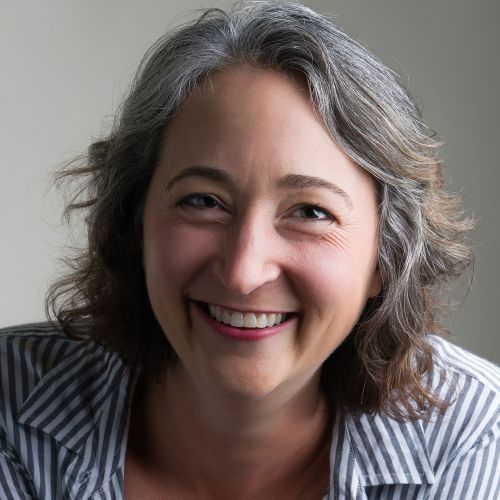
Mo Perry is a freelance writer and theater artist in the Twin Cities. Her writing has appeared in The Atlantic, Catapult, Star Tribune, Minnesota Monthly, and many more publications. She’s a contributing editor for Experience Life magazine, and a member of the Artist Core for Ten Thousand Things Theater.
Continue reading
-
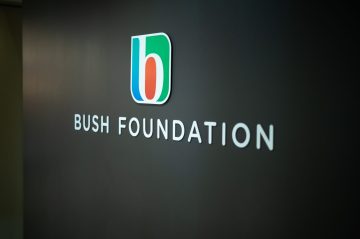
News
Opportunity to work with us
As part of our office move later this year, we are exploring possibilities for the build out of the ground floor of the building. We are in the early stages of this and considering different types of operating models and potential partnerships.
-
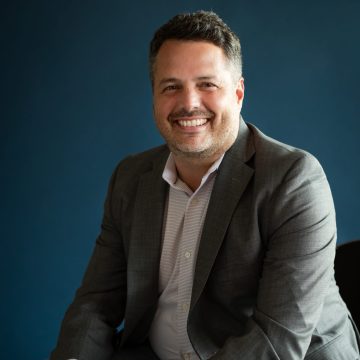
News
Staff note: Making every dollar work through impact investing
We have benefitted from the experience of other funders as we developed our impact investing approach. Now we are paying it forward and sharing what we have done and what we have learned.
-
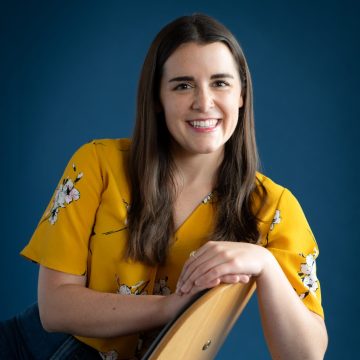
News
Staff note: Coordinating the work of our contact hub
We aim to be radically open in all that we do, and that includes being more accessible to more people and sharing what we learn along the way.